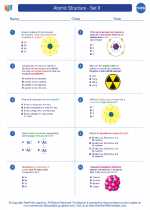Systems in Chemistry
In chemistry, a system refers to a specific portion of the universe that is being studied or observed. It can be as simple as a single chemical reaction or as complex as an entire industrial process. Understanding and analyzing systems is crucial for making predictions, understanding chemical behavior, and designing experiments.
Types of Systems
There are several types of systems in chemistry:
- Open System: Allows the transfer of energy and matter with its surroundings. For example, an open beaker containing a reaction mixture that can exchange heat and reactants with the surrounding environment.
- Closed System: Allows the transfer of energy but not matter with its surroundings. A sealed container holding a chemical reaction is an example of a closed system.
- Isolated System: Does not allow the transfer of energy or matter with its surroundings. An isolated system is an idealized concept and is rarely encountered in practice.
Properties of Systems
When studying a system, it's important to consider the following properties:
- Composition: The types and amounts of substances present in the system.
- Temperature: The average kinetic energy of the particles in the system.
- Pressure: The force exerted by the particles on the walls of the container.
- Volume: The amount of space occupied by the system.
State Functions
State functions are properties that depend only on the current state of the system, not on how the system arrived at that state. Examples of state functions include internal energy, enthalpy, entropy, and Gibbs free energy.
Study Guide
When studying systems in chemistry, it's important to:
- Understand the different types of systems and their characteristics.
- Be able to identify and describe the properties of a given system, such as its composition, temperature, pressure, and volume.
- Recognize the difference between state functions and path functions.
- Practice solving problems involving changes in the properties of a system, such as calculating the change in internal energy or enthalpy.
- Apply the concept of systems to real-world examples and chemical processes.
By mastering the concept of systems in chemistry, you'll be better equipped to analyze chemical reactions, understand thermodynamics, and make informed predictions about the behavior of chemical substances.
[Systems] Related Worksheets and Study Guides:
.◂Chemistry Worksheets and Study Guides High School. Atomic Structure - Set II

 Worksheet/Answer key
Worksheet/Answer key
 Worksheet/Answer key
Worksheet/Answer key
